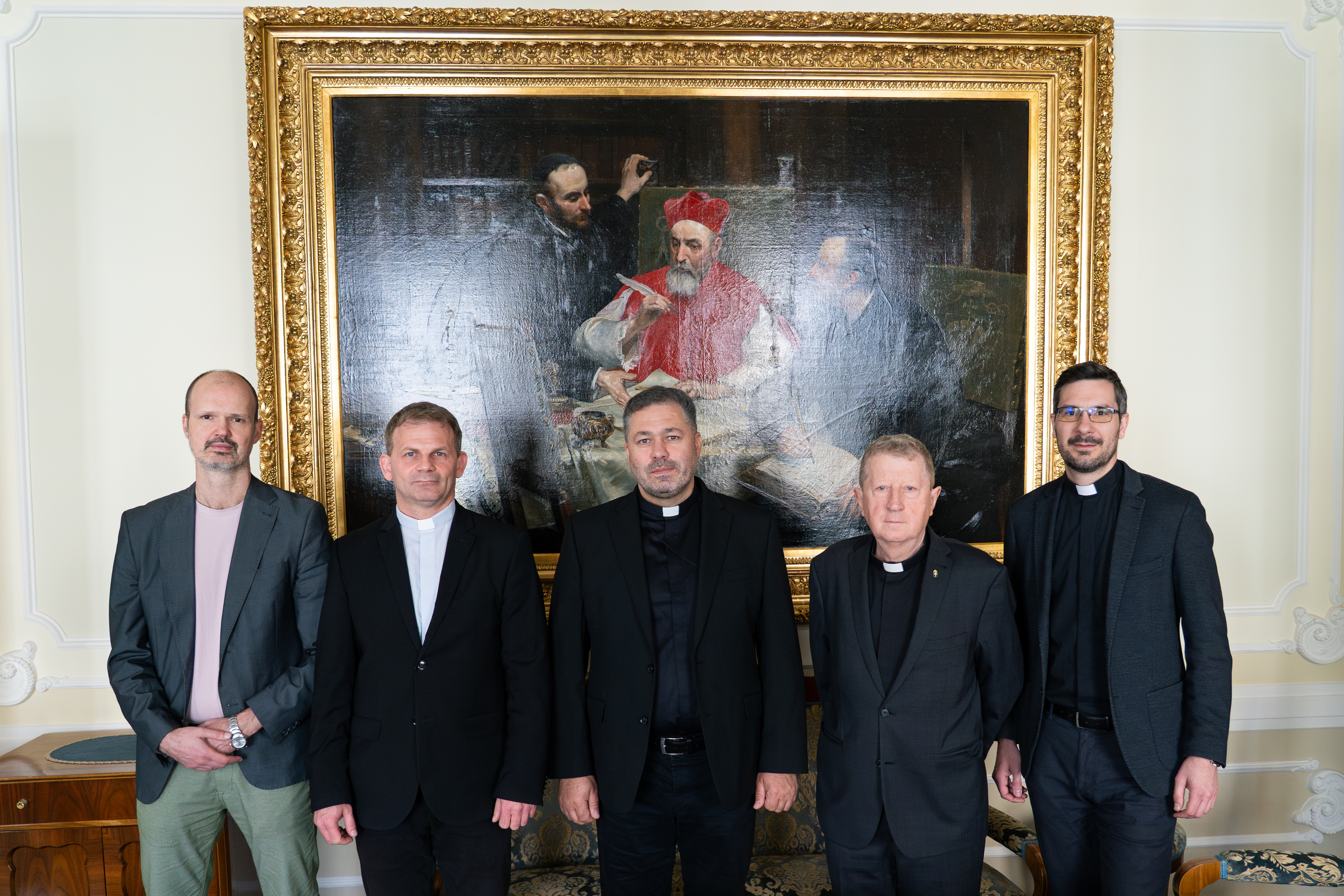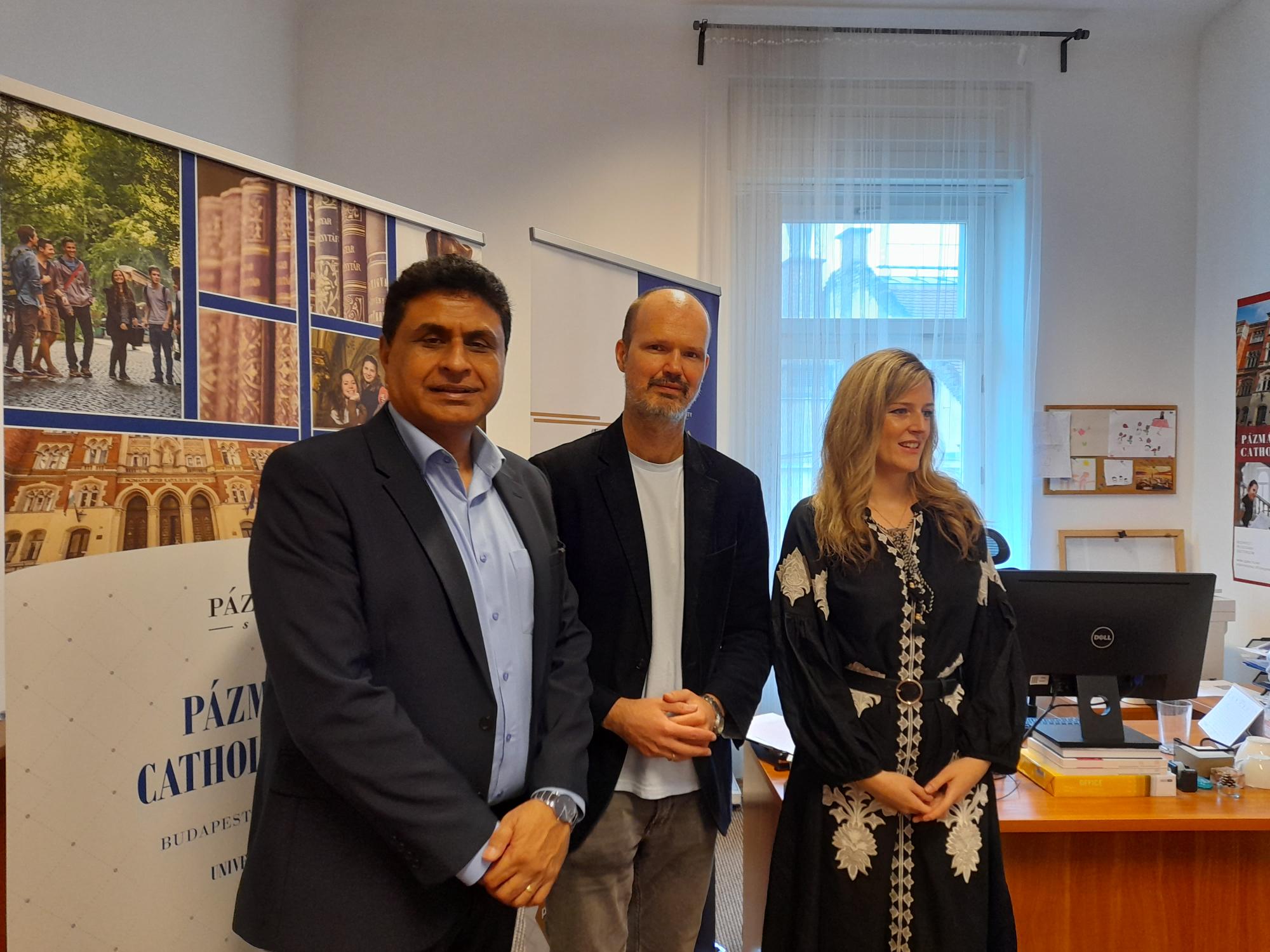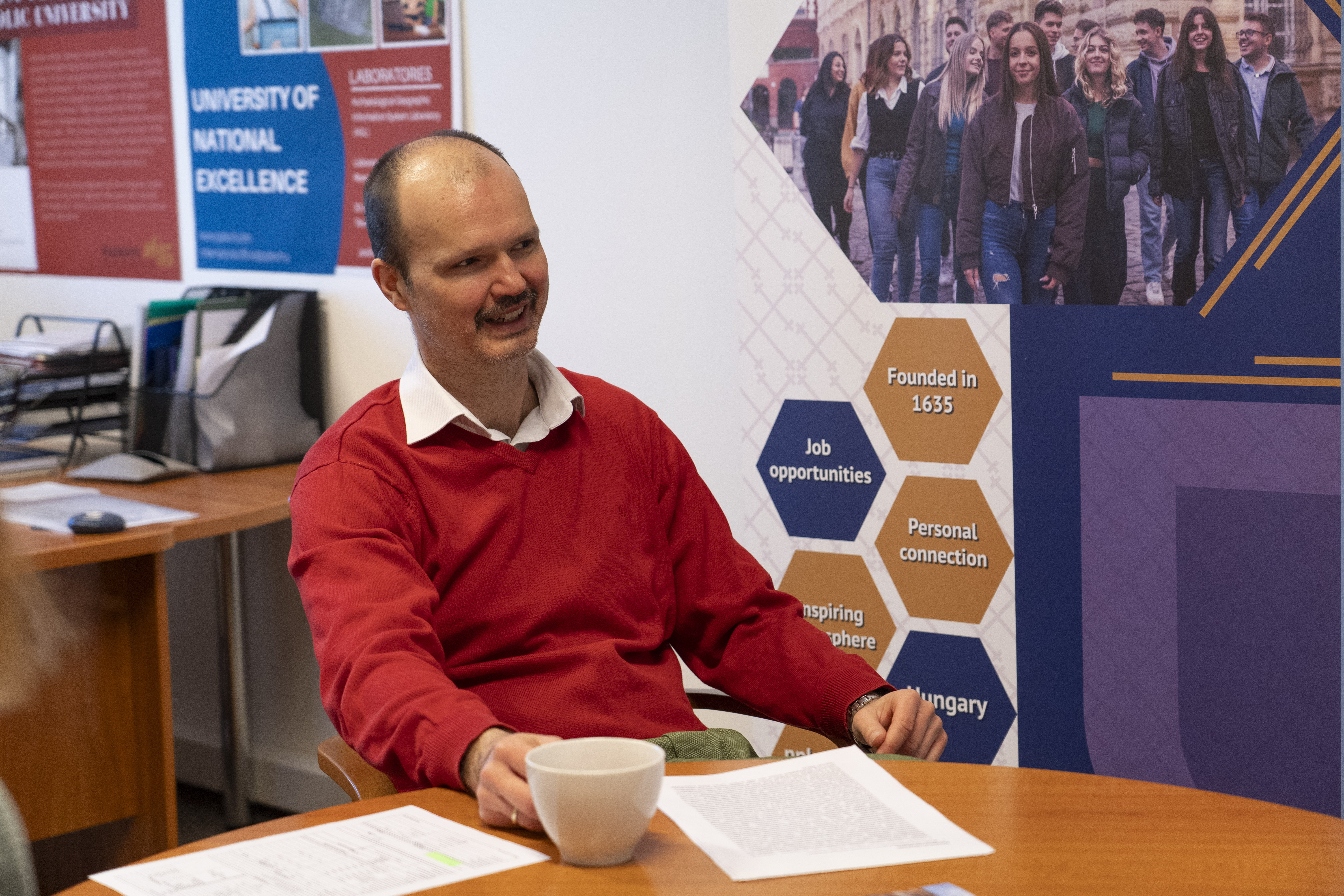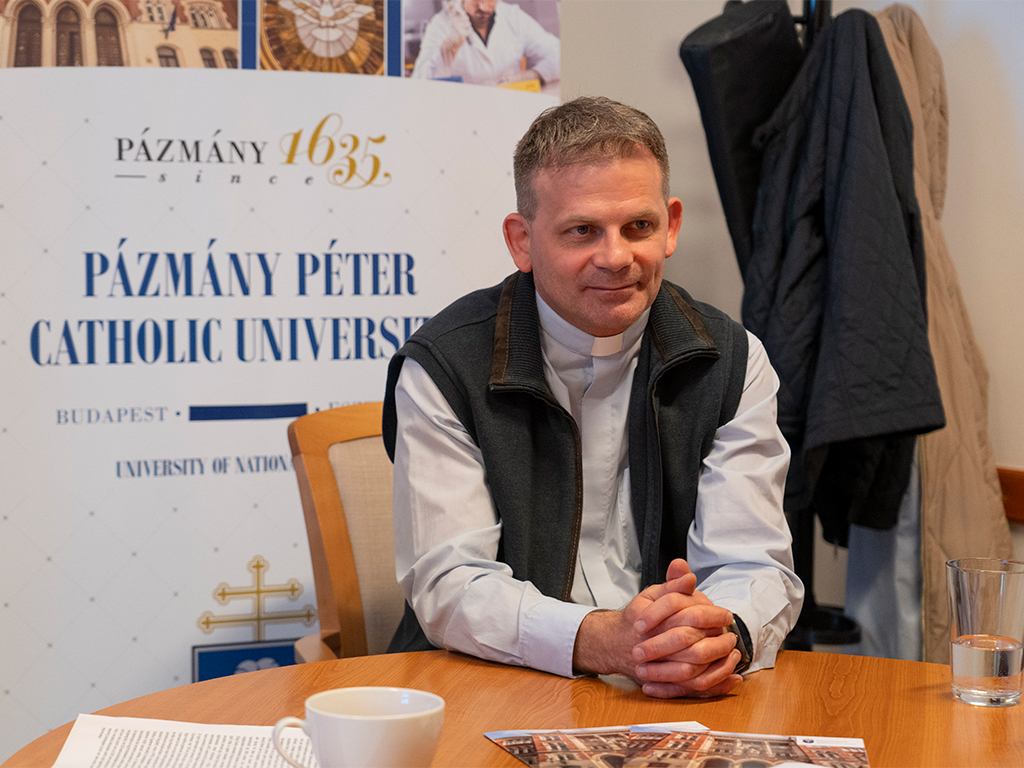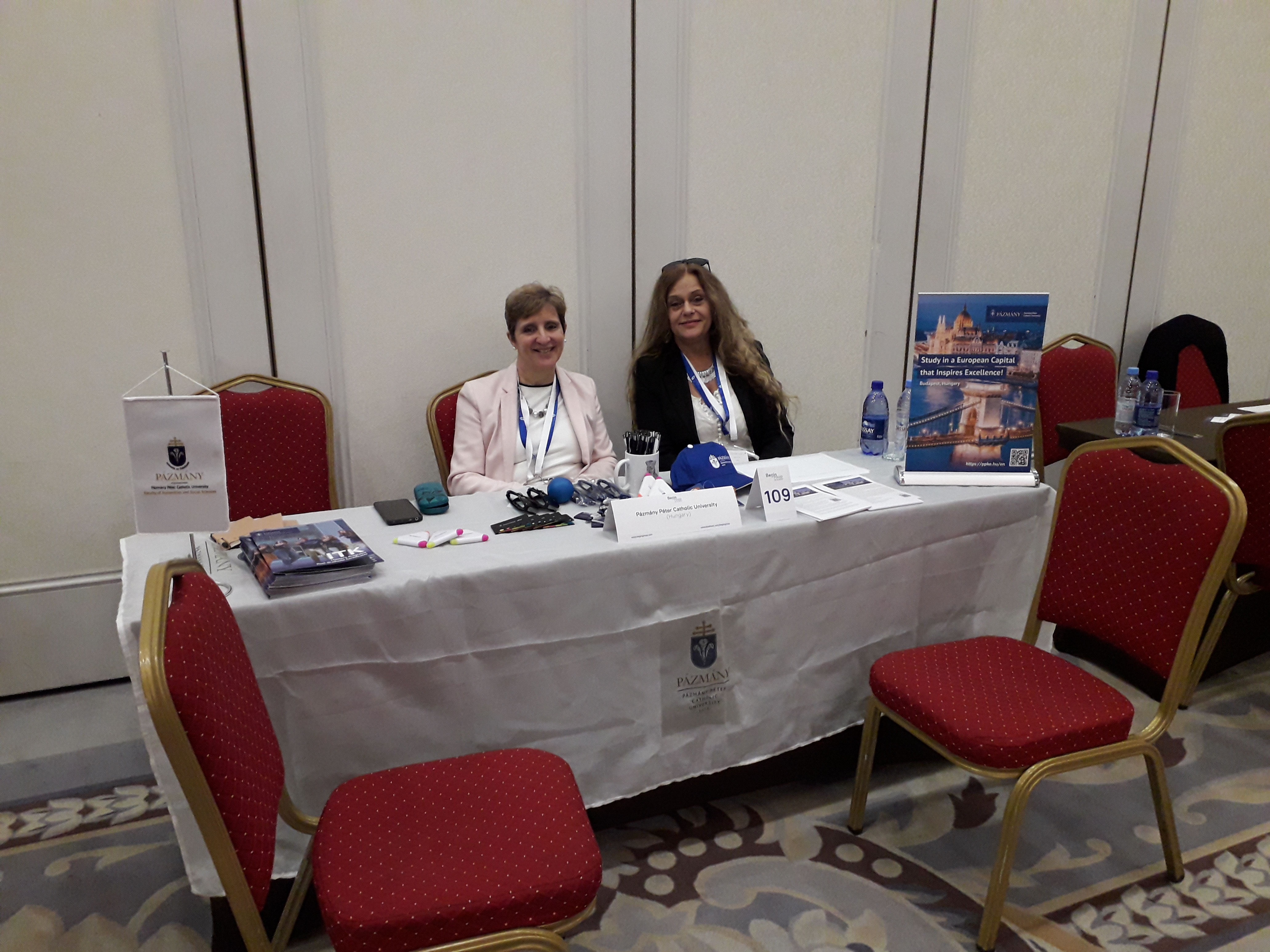2025.05.13
Interview with Dr. Bence Tamássy, Head of Central Office for Foreign Affairs
Erasmus, CEEPUS and other mobility opportunities, attracting and recruiting foreign students, science diplomacy, building international relationships and international marketing: the Central Office for Foreign Affairs of our University carries out a wide range of activities, and has a coordinating and connecting role between the Faculties. We have talked to Dr. Bence Tamássy, Head of Office, about the department’s daily and long-term tasks, objectives and plans.
We are presenting the international activities, mobility and scholarship programs of Pázmány Péter Catholic University in a two-part interview series. This time, Dr. Bence Tamássy, Head of the Central Office for Foreign Affairs, will present the mobility programs, institutional and other international cooperations and activities.
What are the main tasks of the Central Office for Foreign Affairs?
The main role of the Central Office for Foreign Affairs (KKO) is to perform tasks related to the international affairs and activities of the University at a central level. This includes developing the internationalization strategy of the entire University, monitoring and assisting in its implementation, and centrally coordinating international relations. In addition, we are responsible for submitting international applications and managing international mobility programs at the university level. We participate in building the University's international relations, and together with the Vice-Rector for Foreign Affairs and Scientific Management, we represent the University in International Organizations.
However, perhaps our most visible and important task for the students is the coordination of international mobility programs. Of course, the management of the Erasmus+ program is the first to be mentioned, but in addition to this, we are also responsible for the coordination of several other programs with international relevance, such as the CEEPUS program, the Stipendium Hungaricum Program, the Scholarship Program for Christian Young People and the Hungarian Diaspora Scholarship Program, as well as the KA 220 Higher Education Strategic Partnerships, the Hubert-Curien Balaton Program and the Makovecz Scholarship Program. In all of these cases, it can generally be said that the implementation of mobilities takes place at the faculty level, in the Faculties’ International Relations Departments. We provide the institutional-level administration of these programs.
In addition to these everyday tasks, the Central Office for Foreign Affairs plays a major role in introducing and promoting our University abroad, and we are also responsible for managing information brochures in English and the English-language website.
What role does the Office play in building the university's international relations?
It plays both an initiating and coordinating role. In many cases, we are the initiator of a new cooperation, while at other times, based on the needs and requests of the Faculties, we coordinate the development of international relations, support and help the Faculties to achieve their goals. In addition, we negotiate with the Tempus Public Foundation, which is responsible for the coordination of most international programs in Hungary, and we try to achieve the best possible opportunities for the university.
What kind of cooperation does the university have with foreign institutions, partner universities, and organizations?
Our university has effective cooperation agreements with numerous foreign partner universities. International cooperation between two universities usually begins with the signing of a Memorandum of Understanding (MOU), which can later be continued in further, specific forms of cooperation (joint research, joint publication, mutual mobilities, etc.) on this contractual basis. These inter-institutional cooperations usually enable mutual student and staff exchanges and are a starting point for later cooperations.
The cooperation within the already mentioned international mobility programs is also important. At the university level, we have almost 200 partner universities within Europe in the framework of the Erasmus+ program alone, as well as partners from nearly 20 countries outside Europe in the Erasmus+ International Credit Mobility Program. Among the partner university cooperations, our participation in the CEEPUS mobility program is also significant. Here, the participating universities create networks - in the 2024/25 academic year, our university is a member of 5 CEEPUS networks, within which we are in contact with a total of about 54 partner universities.
A high priority in our work is the management of the Stipendium Hungaricum, and the Diaspora scholarship programs, and, as a Catholic university, the Scholarship Program for Christian Young People. We maintain a close cooperation with the Hungarian organizations responsible for the implementation of these scholarship programs (TPF Study in Hungary Directorate and Hungary Helps Agency). Within the framework of the aforementioned scholarship programs, a large number of foreign students begin their studies in our English-language programmes every year, so maintaining daily contact with these organizations is very important in the implementation and successful management of these programs.
What is the priority in selecting new international partners?
We have previously examined which geographical regions are worth targeting at the University level, whether for the purpose of searching for new partners, implementing mobility programs or recruiting students. During the decision, we also took into account the existing relationships and needs of individual faculties, lecturers, and researchers for various partnerships. Thus, a decision was made to target, among othes, the Central Asian region. One of the implementations of this decision was the participation in study fairs in Kazakhstan and Kyrgyzstan, as well as the agreement concluded with the most significant University in Kyrgyzstan, the Kyrgyz-Turkish Manas University.
Of course, strengthening Catholic partnerships is a very important priority for our University. Almost all of our most significant university partners are Catholic institutions with a long history, which, in addition to PPKE, are also members of Catholic university organizations. The common values already create a foundation on which successful professional cooperation can be built in the future.
What international mobility programs are available for the students and staff of the University?
As a church-run university, our University can continue to be part of the opportunities provided by the Erasmus+ Program, so of course this should be mentioned first among the available mobility programs. For our students, this usually means a semester of study abroad, but in the case of a fall semester trip, it is possible to request an extension for the spring semester as well. We often hear about how much administration and paperwork an Erasmus application involves. At Pázmány, the entire application process takes place on an online platform, so it can be handled very conveniently and quickly, which is also a significant relief for our students. In addition to academic mobility, our students can also apply for traineeship mobility, for which they can freely choose a host institution from the countries participating in the Erasmus Program. Professional internship mobility can also be done for up to 12 months after graduation. Shorter types of mobility are also available in the Erasmus program, so that those who do not feel comfortable spending a full semester abroad, can also travel.
Our lecturers can also participate in Erasmus mobility for teaching purposes, and PPKE's non-teaching staff also have the opportunity to join the Erasmus program. They can travel not only to a partner university, but also to any institution freely chosen by the them, and the purpose of the mobility can be varied: staff week participation, language course participation, partner visit, job shadowing. For example, one-week English language courses are particularly popular among our employees.
The opportunities provided by Erasmus are very significant, but there are also several other mobility programs available, what are they?
CEEPUS (Central European Exchange Program for University Studies) is a multilateral exchange program created for Central European universities. The program allows higher education institutions in the participating countries to host guest teachers, exchange students, and organize language and professional courses and summer schools. This program is perhaps less well-known than Erasmus, but it is a very good opportunity if someone wants to teach or study in Eastern, Central European or Balkan countries.
An other opportunity is the Makovecz Program, launched in 2016, which is a program announced every year by the Ministry of Culture and Innovation (KIM), and aims to implement mutual student and teacher mobilities between Hungarian universities and foreign higher education institutions that provide education in Hungarian language. Students have the opportunity to pursue a 1-5-month study mobility at our partner universities abroad.
What are the conditions for applying for Erasmus+ or other mobility programs?
In the case of all the above-mentioned mobility programs, the calls for applications are published by the International Offices of each Faculty, so every student and teacher can submit an application to the call of their own Faculty and inquire about the opportunities with the staff of the Faculties’ International Offices. The opportunities that can be applied for, the list of partners, the application requirements, and the documents to be submitted may differ by faculty and mobility program, so it is worth finding out more about them on the website.
Where can students turn to with questions about organizing studies or internships abroad?
International mobility programs operate in a decentralized manner at our university, meaning that the application of outgoing students, the selection of winners, and the administrative management of mobility are the responsibility of the Faculties’ International Offices. Erasmus coordinators appointed by each faculty can help the applying students. All outgoing students can contact them in person, by email or by phone, for example, regarding foreign course registration or other administrative matters.
Are there any international scholarships that are specifically available to Pázmány students?
Our partner universities and the Catholic university organizations of which we are members, regularly offer mobility opportunities specifically for Pázmány students and colleagues. These include full-semester mobilities, but also shorter-term summer schools, intensive courses or conferences. We always advertise these opportunities among our students and professors. A good example of the opportunities offered by Catholic university organizations is that in 2023, we were able to participate in a week-long leadership training with a colleague from the Faculty of Law, at the University of Notre Dame in the USA. And – as Vice-Rector Ft. Dr. Krisztián Vincze mentioned earlier – this summer, three of our colleagues from Pázmány will travel to Rome for a women's leadership training. All of this was made possible through the CUP (Catholic Universities Partnership) relations. Or I could also mention that last year, two of our students participated in a summer university in Madrid, completely free of charge, thanks to these opportunities. All of this shows that these are not collaborations existing just on paper, but truly living ones, from which our students and teachers can also benefit.
What are the most popular destinations for outgoing students?
The most popular destinations for our students are France, Germany, Spain, Portugal and Italy. In addition, Central and Eastern European countries and Romania are also popular destinations for shorter-term mobility. Our teachers usually go to partners with whom they have long-standing relationships, such as universities in Belgium, Poland, the Czech Republic and Italy. During staff mobility, our colleagues are happy to visit partner universities, but language course participation is also very popular. The most popular destinations for English language courses are Malta, Ireland and the United Kingdom, where employees can develop their language skills in a native-speaking environment.
When it comes to mobility programs, we primarily think of Hungarian students traveling to foreign universities for shorter or longer periods. But this also happens the other way around, PPKE also accepts foreign students.
In this regard, it is important to distinguish between degree-seeking students studying at full-time degree programs here and the part-time students. The majority of full-time students are students with Stipendium Hungaricum (SH), Diaspora and Christian Young People’s scholarships, as well as a small number of self-financed foreign students. Depending on their program, they study here for two to three years and they live in Hungary during their studies. Part-time students usually come for only one semester, most of them of course in the Erasmus Program, but a small number also come for shorter mobilities in the CEEPUS Program. This way, a very diverse international student community can develop in every Faculty and in every semester.
The mentors who help foreign students during their stay here, as well as the faculty's international offices, try to help our foreign students integrate with various programs. They have already organized joint excursions, study trips, intercultural evenings, and dance halls for students. These events not only help our international students feel more at home here, but also provide an opportunity to build relationships between them and the Hungarian students.
How many foreign students study at the university in a semester, and from which countries do they come?
There is always a fluctuation in the number of Erasmus students, with more students always arriving in the fall semester than in the spring semester. At the university level, the number of foreign students studying with us under Erasmus is around 160 in the fall semester, while in the spring semester it is around 90. Including full-time students, the number of international students studying at PPKE in a semester can be estimated at around 350-400.
In terms of sending countries, a large proportion of students in the Erasmus program come from France, Italy, Spain, Portugal and Germany, the countries with which we have the most partner university realtions in the program. The largest number of students in the SH program come to us from Syria, and in the Scholarship for Christian Young People Program, a large number of Armenian students study at Pázmány, thanks to our University's excellent Armenian partnerships.
How would you like to further develop and strengthen the international presence of the university?
It is definitely an important goal to strengthen the university's international student community so that even more international students choose our university. We have already taken important steps to achieve this, but in the future we clearly want to strengthen recruitment activities among foreign students. In addition, strengthening international marketing activities is also an important goal so that our students and prospective students can encounter more and more English-language content not only on our website but also on social media. An encouraging process has started, of which there are already visible signs, and we would like to strengthen this further in the near future.
What challenges does the Office face in strengthening international relations?
Perhaps one of the biggest challenges is to coordinate the different needs of the Faculties. The four Faculties of the University have different professional and training profiles, so it is often a challenge to be able to assess the needs, priorities and goals of each Faculty regarding its international activities and to coordinate them. We must pay attention to these differences when developing the University's unified internationalization strategy.
The world has accelerated, needs are changing, and therefore it is a challenge to build deep relationships, it is difficult to take the roots deeper than the surface, so that there are partner universities with whom we are connected on deeper lines. There are European initiatives for this, as an example I would mention the joint master's degree program of our Faculty of Information Technology and Bionics with a French and a Spanish partner university. At the same time, Catholic university networks and alliances help in achieving deeper relationships.
In today's world, interstate and political relations can change quickly, so the kind of permanence that does not depend on individuals or political sympathies, but is based on a common set of values, worth more. Values such as what connects Catholic universities. I would highlight the importance of church diplomacy and science diplomacy, whether with the Holy See, various Catholic organizations or representatives of other Christian churches. A good example of this is the Armenian relationship mentioned above, which existed even when interstate relations between Hungary and Armenia were at their lowest point.
